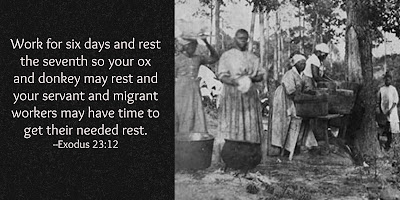Today's Bible verse from Exodus made me think about unions and everything those workers and strikers did for us.
We're approaching March 8, which has been called a "Day Without Women." Women have been called upon to do one of the following things:
--Take the day off from paid and unpaid work
--Avoid shopping (except at small, woman- and minority-owned businesses)
--Wear red in solidarity
Some organizations, like NARAL North America, are even closing their doors on that day. The idea of a general strike is that it will force people to notice how important and under-appreciated women's work is. Realistically, the strike from work will mostly be a day without privileged women--those who have the means and security to skip work for a day--so I'm glad they've given a few other options of ways to participate.
Did you know that black washer women went on strike in Atlanta in 1881? They took on Atlanta's business and political establishment and nearly shut the city down. More black women worked as laundresses than in any other type of domestic work, and laundry was the most difficult of all domestic jobs. They worked long, back-breaking hours, and their wages ranged from $4 to 8 per month.
With the help of black ministers, 20 laundresses met together to talk about how to demand a standard, uniform rate of pay and better working conditions. (This was less than two decades after the end of slavery.) The Washing Society canvassed door to door to recruit new members (including some white laundresses too, a rare show of interracial solidarity at the time). In three weeks, their numbers grew from 20 to 3,000 strikers! Read more about the black women organizers and their accomplishments.
A few years after this strike in Atlanta, in 1886, the AFL was formed, and its first president, Samuel Gompers, denied membership to women because he thought their place was in the home. His antiquated attitude was not so different from that of modern-day right-wingers, who still resist women's advancement in the workplace and worker's rights in general.
But if we didn't have unions, we would not have these things:
- Weekends
- Paid vacation
- Sick leave
- Social security
- 40-hour work week
- Pensions
- Unemployment insurance
- Child labor laws
- Overtime pay
- Wrongful termination laws
- 8-hour work day
- Workplace safety laws
- Collective bargaining rights of workers
So next time you go to work, be thankful to all the people who did the dirty work of resisting, striking, and agitating before us!
Read more of my "I Was a Stranger" entries here.

Comments
Post a Comment